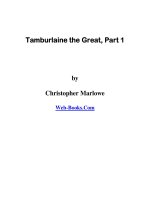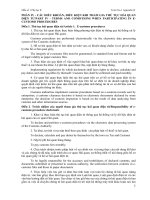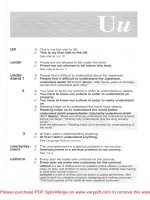Faust - Part I
Bạn đang xem bản rút gọn của tài liệu. Xem và tải ngay bản đầy đủ của tài liệu tại đây (87.86 KB, 11 trang )
Faust - Part I
by
Johann Wolfgang Von Goethe
Web-Books.Com
Faust - Part I
Introductory Note ..................................................................................................3
Dedication.............................................................................................................6
Prologue For The Theatre ......................................................................................7
Prologue In Heaven ............................................................................................. 14
Dramatis Personae ............................................................................................... 19
Part I: Night ........................................................................................................ 20
Auerbach's Cellar In Leipzig................................................................................. 76
The Neighbour's House...................................................................................... 113
Night. Street Before Margaret's Door.................................................................. 148
Walpurgis-Night................................................................................................ 157
Walpurgis-Night's Dream .................................................................................. 172
A Gloomy Day. A Plain ...................................................................................... 179
Night. Open Country ......................................................................................... 182
DUNGEON...................................................................................................... 183
Introductory Note
JOHANN WOLFGANG VON GOETHE, the greatest of German men of letters,
was born at Frank fort-on-the-Main, August 28, 1749. His father was a man of
means and position, and he personally supervised the early education of his son.
The young Goethe studied at the universities of Leipsic and Strasburg, and in
1772 entered upon the practise of law at Wetzlar. At the invitation of Karl August,
Duke of Saxe-Weimar, he went in 1775 to live in Weimar, where he held a
succession of political offices, becoming the Duke's chief adviser. From 1786 to
1788 he traveled in Italy, and from 179' to 1817 directed the ducal theater at
Weimar. He took part in the wars against France, 1792-3, and in the following
year began his friendship with Schiller, which lasted till the latter's death in 1805.
In 1806 he married Christiane Vulpius. From about 1794 he devoted himself
chiefly to literature, and after a life of extraordinary productiveness died at
Weimar, March 22, 1832. The most important of Goethe's works produced before
he went to Weimar were his tragedy "Gotz von Berlichingen" (1773), which first
brought him fame, and "The Sorrows of Young Werther," a novel which obtained
enormous popularity during the so-called "Sturm und Drang" period. During the
years at Weimar before he knew Schiller he began "Wilhelm Meister," wrote the
dramas, "Iphigenie," "Egmont," and "Torquato Tasso," and his "Reinecke Fuchs."
To the period of his friendship with Schiller belong the continuation of "Wilhelm
Meister," the beautiful idyl of "Hermann and Dorothea," and the "Roman Elegies."
In the last period, between Schiller's death in 1805 and his own, appeared
"Faust," "Elective Affinities," his autobiographical "Dichtung und Wahrheit"
("Poetry and Truth"), his "Italian Journey," much scientific work, and a series of
treatises on German Art.
Though the foregoing enumeration contains but a selection front the titles of
Goethe's best known writings, it suffices to show the extraordinary fertility and
versatility of his genius. Rarely has a man of letters had so full and varied a life,
or been capable of so many-sided a development. His political and scientific
activities, though dwarfed in the eyes of our generation by his artistic production,
yet showed the adaptability of his talent in the most diverse directions, and
helped to give him that balance of temper and breadth of vision in which he has
been surpassed by no genius of the ancient or modern world.
The greatest and most representative expression of Goethe's powers is without
doubt to be found in his drama of "Faust"; but before dealing with Goethe's
masterpiece, it is worth while to say something of the history of the story on
which it is founded--the most famous instance of the old and widespread legend
of the man who sold his soul to the devil. The historical Dr. Faust seems to have
been a self-called philosopher who traveled about Germany in the first half of the
sixteenth century, making money by the practise of magic, fortune-telling, and
pretended cures. He died mysteriously about 1540, and a legend soon sprang up
that the devil, by whose aid he wrought his wonders, had finally carried him off. In
1587 a life of him appeared, in which are attributed to him many marvelous
exploits and in which he is held up as an awful warning against the excessive
desire for secular learning and admiration for antique beauty which characterized
the humanist movement of the time. In this aspect the Faust legend is an
expression of early popular Protestantism, and of its antagonism to the scientific
and classical tendencies of the Renaissance.
While a succession of Faust books were appearing in Germany, the original life
was translated into English and dramatized by Marlowe. English players brought
Marlowe's work back to Germany, where it was copied by German actors,
degenerated into spectacular farce, and finally into a puppet show. Through this
puppet show Goethe made acquaintance with the legend.
By the time that Goethe was twenty, the Faust legend had fascinated his
imagination; for three years before he went to Weimar he had been working on
scattered scenes and bits of dialogue; and though he suspended actual
composition on it during three distinct periods, it was always to resume, and he
closed his labors upon it only with his life. Thus the period of time between his
first experiments and the final touches is more than sixty years. During this
period the plans for the structure and the signification of the work inevitably
underwent profound modifications, and these have naturally affected the unity of
the result; but, on the other hand, this long companionship and persistent
recurrence to the task from youth to old age have made it in a unique way the
record of Goethe's personality in all its richness and diversity.
The drama was given to the public first as a fragment in 1790; then the
completed First Part appeared in 1808; and finally the Second Part was
published in 1833, the year after the author's death. Writing in "Dichtung und
Wahrheit" of the period about 1770, when he was in Strasburg with. Herder,
Goethe says, "The significant puppet-play legend . . . echoed and buzzed in
many tones within me. I too had drifted about in all knowledge, and early enough
had been brought to feel the vanity of it. I too had made all sorts of experiments
in life, and had always come back more unsatisfied and more tormented. I was
now carrying these things, like many others, about with me and delighting myself
with them in lonely hours, but without writing anything down." Without going into
the details of the experience which underlies these words, we can see the be
ginning of that sympathy with the hero of the old story that was the basis of its
fascination and that accounted for Goethe's departure from the traditional
catastrophe of Faust's damnation.
Of the elements in the finished Faust that are derived from the legend a rough
idea may be obtained from the "Doctor Faustus" of Marlowe, printed in the
present volume. As early as 1674 a life of Faust had contained the incident of the
philosopher's falling in love with a servant-girl; but the developed story of
Gretchen is Goethe's own. The other elements added to the plot can be noted by
a comparison with Marlowe.
It need hardly be said that Goethe's "Faust" does not derive its greatness from its
conformity to the traditional standards of what a tragedy should be. He himself
was accustomed to refer to it cynically as a monstrosity, and yet he put himself
into it as intensely as Dante put himself into "The Divine Comedy." A partial
explanation of this apparent contradiction in the author's attitude is to be found in
what has been said of its manner of composition. Goethe began it in his romantic
youth, and availed himself recklessly of the supernatural elements in the legend,
with the disregard of reason and plausibility characteristic of the romantic mood.
When he returned to it in the beginning of the new century his artistic standards
had changed, and the supernaturalism could now be tolerated only by being
made symbolic. Thus he makes the career of Faust as a whole emblematic of the
triumph of the persistent striving for the ideal over the temptation to find complete
satisfaction in the sense, and prepares the reader for this interpretation by
prefixing the "Prologue in Heaven." The elaboration of this symbolic element is
responsible for such scenes as the Walpurgis Night and the Intermezzo, scenes
full of power and infinitely suggestive, but destructive of the unity of the play as a
tragedy of human life. Yet there remains in this First Part even in its final form
much that is realistic in the best sense, the carousal in Auerbach's cellar, the
portrait of Martha, the Easter-morning walk, the character and fate of Margaret. It
is such elements as these that have appealed to the larger reading public and
that have naturally been emphasized by performance on the stage, and by virtue
of these alone "Faust" may rank as a great drama; but it is the result of Goethe's
broodings on the mystery of human life, shadowed forth in the symbolic parts and
elaborated with still greater complexity and still more far-reaching
suggestiveness--and, it must be added, with deepening obscurity--in the Second
Part, that have given the work its place with "Job," with the "Prometheus Bound,"
with "The Divine Comedy," and with "Hamlet."









